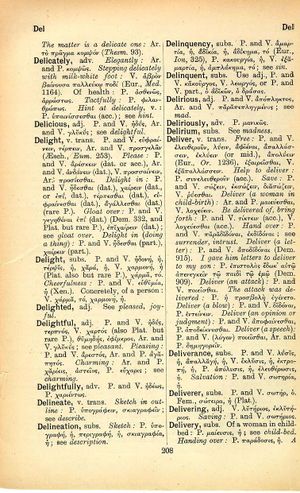delirium: Difference between revisions
From LSJ
ὦ παῖδες Ἑλλήνων ἴτε ἐλευθεροῦτε πατρίδ', ἐλευθεροῦτε δὲ παῖδας, γυναῖκας, θεῶν τέ πατρῴων ἕδη, θήκας τε προγόνων: νῦν ὑπὲρ πάντων ἀγών. → O children of the Greeks, go, free your homeland, free also your children, your wives, the temples of your fathers' gods, and the tombs of your ancestors: now the struggle is for all things.
(D_3) |
(Gf-D_3) |
||
| Line 1: | Line 1: | ||
{{Woodhouse1 | {{Woodhouse1 | ||
|Text=[[File:woodhouse_208.jpg|thumb|link= | |Text=[[File:woodhouse_208.jpg|thumb | ||
|link={{filepath:woodhouse_208.jpg}}]]'''subs.''' | |||
See [[madness]]. | See [[madness]]. | ||

